![]()
![]()
![]()
Use LEFT and RIGHT arrow keys to navigate between flashcards;
Use UP and DOWN arrow keys to flip the card;
H to show hint;
A reads text to speech;
134 Cards in this Set
- Front
- Back
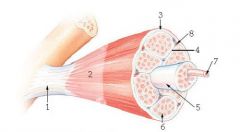
Identify a muscle bundle/fascicle
|
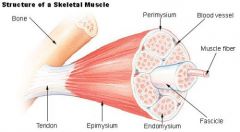
|
|
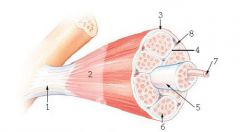
Identify a muscle cell/fiber
|
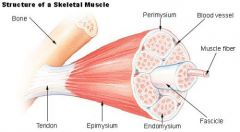
|
|
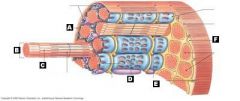
Identify a myofibril
|
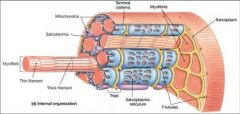
|
|
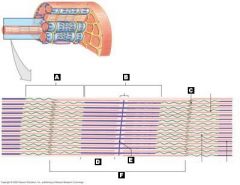
Identify a sarcomere
|
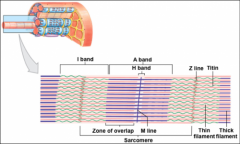
|
|
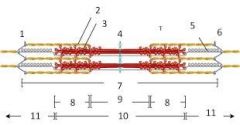
Identify an actin/ thin filament
|

|
|
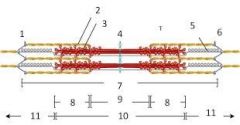
Identify a myosin/ thick filament
|

|
|
|
Structure of an amino acid
|
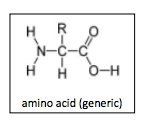
|
|
|
Structure of a nucleotide
|
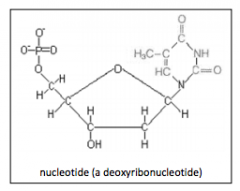
|
|
|
Structure of a phospholipid
|
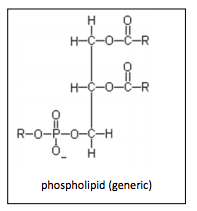
|
|
|
Structure of trans unsaturated fatty acid, cis unsaturated fatty acid and saturated fatty acidWhich of these are generally considered unhealthy?
|
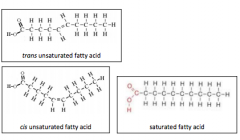
Saturated fat and trans fat
|
|
|
Structure of a triglyceride
|
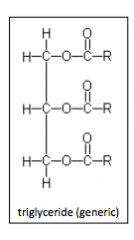
|
|
|
Structure of the carbohydrates: glucose, galactose, fructose
|

|
|
|
If a protein is considered a chain, we'd say its links are ____ ____
|
Amino acids
|
|
|
Discuss three to five classes of protein and describe what they do
|
Enzymes - facilitate chemical reactions in our cells, structural - maintain integrity of our cells, transport - control what goes in and out of cells, motor/contraction - facilitate movement such as muscle contractions
|
|
|
Are all proteins capable of carrying out the same functions as other proteins? Why or why not?
|
No, because proteins differ from each other in their 3-dimensional shape
|
|
|
If we consider nucleic acid a chain, we'd say its links are ____
|
Nucleotides
|
|
|
What do DNA and RNA do?
|
DNA tells RNA how to make proteins, and RNA makes proteins
|
|
|
What's the main difference between a single strand of DNA and a single strand of RNA?
|
The nucleotides of each are made in part of ribose, a simple sugar, but in DNA, the ribose is actually called "deoxyribose" because one of ribose's oxygen atoms is missing (more correctly, one of its hydroxides has been replaced with a hydrogen atom)
|
|
|
ATP is our immediate energy source. What molecule do our cells prefer to use to make ATP?
|
Glucose (a simple sugar)
|
|
|
Monosaccharides, disaccharides, and polysaccharides are _____. Monosaccharides and disaccharides are usually called simple ____. Polysaccharides, especially those in whole fruits and whole vegetables, are usually called complex _____.
|
Carbohydrates, sugars, carbohydrates
|
|
|
Name the three monosaccharides many of us eat
|
Glucose, fructose, galactose
|
|
|
Name the three disaccharides many of us eat. Identify the two monosaccharides that make them
|
Sucrose - glucose and fructose
maltose - glucose and glucose lactose - glucose and galactose |
|
|
What are the three polysaccharides many of us eat?
|
Starch, cellulose, glycogen
|
|
|
All three of these polysaccharides are nothing more than chains of glucose. Howe, then, do they differ from each other?
|
They differ in how their glucose units are linked together
|
|
|
Which of these polysaccharides do we consume when we eat meat or liver?
|
Glycogen
|
|
|
Which two polysaccharides are made by plants and make up the tissue of plants?
|
Starch and cellulose
|
|
|
Which of these two polysaccharides can we digest and thus use for energy?
|
Glycogen and starch
|
|
|
Which os these two polysaccharides serves as "fiber" or what some call "bulk" in our diets? Can we digest and extract energy from this molecule? Why or why not?
|
Cellulose; no, we can't digest cellulose, and thus we can't extract energy from it; because we don't have the enzyme needed to break the kind of bond that links its glucose units together
|
|
|
What two molecules do people make to store excess energy (particularly, glucose) they've eaten?
|
Glycogen and triglyceride
|
|
|
Which of these two molecules is made first if a person consumes more glucose than needed? When is the second made?
|
Glycogen is made first; triglyceride is made after
|
|
|
Which parts of our body make glycogen? What parts store glycogen?
|
To both questions ; liver and muscles
|
|
|
What part of our body makes triglyceride out of excess sugar?
|
Liver
|
|
|
Is all of the triglyceride stored in our body made from sugar we eat? Explain.
|
No. Some of the triglycerides we store are made from the fats we eat
|
|
|
What is the name of the process that allows our cells to extract energy from our food? The "point" of this process is to make bunches of ____
|
Respiration (a.k.a, cellular respiration); the point of respiration is to make bunches of ATP
|
|
|
Molecular oxygen (O2) is necessary to fully extract energy from our food. Explain why this is by telling me why it's legitimate to think of this process as being akin to electricity.
|
Hydrogen electrons from glucose or fatty acids, etc. are passed from one protein to another and eventually to oxygen. This flow of electrons can be thought of as being driven by oxygen pulling these electrons down a "power line" made of the proteins embedded in inner membrane o mitochondria
|
|
|
If glucose, fatty acids, and ketones are molecules from which we extract energy to live, why do we consider ATP our ultimate energy molecule? Hint: think about the definitions of energy and work.
|
Energy is the capacity to do work, and work is the movement or rearrangement of matter, so the fact that ATP changes the shape of molecules and causes them to move means that ATP functions as energy
|
|
|
Why is it misleading (and incomplete) to say that plants breathe carbon dioxide (CO2) and that people breathe oxygen (O2)
|
People and plants live on land breathe air, and air is made of nitrogen (78%), oxygen (21%), and other molecules, including carbon dioxide (nearly 0.04%)
|
|
|
Why is it incorrect and misleading to say that plants photosynthesize to make oxygen for people?
|
Plants photosynthesize because they have chlorophylls and other molecules that causes them to photosynthesize. OF a person insists on personifying plants, then one could say that plants photosynthesize to make food (i.e. sugar) for themselves. Oxygen is simply a wast by-product of the process that both plants and animals use in cellular respiration
|
|
|
What causes discomfort when holding one's breath and inevitable muscle contractions that force one to breathe?
|
Buildup of CO2 in the blood
|
|
|
What causes this buildup of CO2 in the blood?
|
Cellular respiration
|
|
|
What would eventually kill us if nothing else did? Why?
|
Oxygen (O2); because it damages our proteins and DNA when it steals electrons from them or when it creates "free radicals" that steal electrons from our proteins and DNA
|
|
|
Name and identify the different parts of our digestive system (but only the organs)
|
Mouth, stomach, small intestine, pancreas, liver, gall bladder
|
|
|
In what parts of our digestive system do enzymes carry out chemical digestion?
|
Mouth, stomach, and small intestine
|
|
|
Where does most enzyme-based digestion occur?
|
Small intestine
|
|
|
Which organ secretes digestive enzymes in to small intestine?
|
Pancreas
|
|
|
Bile is made by the ___, stored in the ___ ___, and secreted into the ___ ____.
|
liver, gall bladder, small intestine
|
|
|
Bile's function is to __ __ __ __ __
|
facilitate the breakdown/digestion of lipids
|
|
|
Why must disaccharides and complex carbohydrates be digested if we are to make use of them?
|
Because they are too large to be absorbed by the small intestine's cells.
|
|
|
Why is it healthier to eat complex carbohydrates than simple sugars?
|
Simple sugars are absorbed quickly (because they don't have to be digested, or because they require only one or two chemical reactions to be digested), and this rapid absorption can overburden the pancreas and cause sugar concentration in the blood to spike, which in turn can damage nerves, blood vessels, and tissues with high concentrations of nerves or capillaries. In contrast, complex carbohydrates require more chemical reactions to be digested, and as a result the glucose molecules they're made of are absorbed more slowly and more steadily, thereby avoiding the glucose spikes associated with eating/ drinking simple sugars
|
|
|
Why is it correct to say that refined sugars such as pure sucrose, pure glucose, pure fructose, or high fructose syrups are unhealthy if consumed in anything greater than small amounts?
|
Refined sugar is easily and rapidly digested and absorbed, causing spikes/ surges in blood sugar levels if consumed in more than small moderate amounts. A surge of glucose can overwhelm our supply of insulin, causing damage to blood vessels & nerves Liver cells are the only cells in our bodies that metabolize fructose, and refined sugar is 50% fructose, so too much fructose can overburden the liver and cause fatty liver disease
|
|
|
Why is it nonsense for someone to say that sugar is poison?
|
Because glucose, which is a sugar, is the energy source our cells tend to prefer, and it's the energy source *required* by cells of our central nervous system (i.e., brain, spinal cord, etc.).
|
|
|
Which organ detoxifies the by-product created when cels metabolize a protein's amino acids?
|
The liver converts ammonium into urea
|
|
|
Why is eating too much protein unhealthy?
|
Ammonia created by metabolism of amino acids that make up protein overwhelms and damages the liver and kidneys. Ammonia is toxic, and too much will overwhelm and damage the liver and kidneys
|
|
|
Where does most absorption of the molecules we eat occur?
|
Small intestine
|
|
|
Where do amino acids and monosaccharides go after they are absorbed by small intestine cells?
|
Liver
|
|
|
Where does fat go after it's absorbed by small intestine cells?
|
Lymphatic system (then to blood, liver, etc)
|
|
|
How much energy is contained in carbohydrates, protein, and lipids?
|
Carbs 4 kilocalories per gram (kcal/g); protein 4 kcal/g to 6 kcal/g; lipids 9 kcal/g
|
|
|
If we have the choice of eating 100 grams of carbohydrate or 50 grams of fat mixed with 50 grams of carbohydrate, which would provide more energy and thus more weight gain if we don't use the energy? Show the energy of each
|
50 g of fat and 50 g of carb eaten together provide more energy [(9 kcal x 50) + (4 kcal x 50) = 650 kcal] than 100 g of carb ( 4 kcal x 100 = 400 kcal)
|
|
|
Metabolic rate is measure of how much energy our body uses up per unit time ( e.g., kcal per hours). What factors affect our metabolic metabolic rate, how do they affect it, and how relevant is behavior?
|
Lean body mass and thyroid hormones affect metabolic rate
- Metabolic rate increases with an increase in lean body mass (i.e., with an increase in muscle per unit body weight). This factor can be meaningfully modified by behavior - Metabolic rate increases with increase in two hormones produced by the thyroid gland. Behavior has little effect on levels of these hormones, but behavior can- to a moderate extent - counteract some effects caused by abnormalities in levels of these hormones |
|
|
What factors affect our appetite?
|
-the hormone leptin is produced by fat cells decreases appetite-the hormone ghrelin is produced by stomach cells and increases appetite- habits and emotions affect hormones and neurotransmitters and therefore appetite
|
|
|
Too much calorie restriction can be extremely dangerous, even lethal, by screwing up the immune system and the endocrine system among other things. However, controlled experiments show that mild calorie restriction can be quite heathy and increase life-span (assuming one still eats proper proportion of carbohydrate, protein, and fat). What is one of the reasons that explains this effect of reducing our calorie intake?
|
Mitochondria operate less efficiently when high amounts of energy are available, resulting in more free radicals such as superoxide. Free radicals damage our cells and cause many aging effects
|
|
|
What's more dangerous, and "apple body type of "pear" body type? Why?
|
Apple, because the "apple" type usually indicates high amounts of fat inside the abdominal cavity (i.e., abdominal visceral adipose), which is associated with heart disease, stroke, and type 2 diabetes; in contrast, the "pear" type usually indicates subcutaneous fat in the hips and thighs
|
|
|
What's more dangerous, subcutaneous adipose (i.e., fat tissue) or visceral adipose? Why?
|
Visceral adipose is more dangerous because it is deep in the abdominal cavity and is associated with heart disease, stroke, and type 2 diabetes
|
|
|
All-out anorexia is an unhealthy condition that kills. Is it a major problem for the U.S population? Explain
|
No, it's a problem for people who have the condition, but it can't be considered a major problem for the U.S population because very few people who suffer from it (.6% of the population) according to data reported by the U.S Centers for Disease Control and the U.S National Institutes of Health
|
|
|
Why is true, full-bore obesity dangerous?
|
It's associated with heart disease, stroke, type 2 diabetes, and other problems with vital organs
|
|
|
How much of the the U.S population suffers anorexia? How much of the U.S population is overweight? How much of the U.S population is obese?
|
Anorexia = .6%; overweight = 50%; obese = 25%
|
|
|
Body Mass Index (BMI) is currently used by health insurance companies and many employers to determine coverage levels and premium costs. What's wrong with applying the BMI too strictly to individuals?
|
BMI is not a measure of health or physical fitness, so it's inappropriate to "over" apply it when judging a person's health. Many "star" athletes who are amazingly "fit" are clinically obese
|
|
|
What's the relationship between risk of death and BMI?
|
Risk of death is meaningfully higher for people who are extremely "underweight" and for people who are extremely "overweight". However, people who are mildly overweight (BMI of 25 - 30) have practically no higher risk of death than people who have an ideal BMI
|
|
|
Did the prof. claim in class or elsewhere that it is not morally okay to kill human embryos? |
No! |
|
|
Can science tell us whether it's morally okay to kill human embryos? Explain |
No! Science relies on observation to answer questions, and observation does not provide information that can answer questions about morality. |
|
|
What is the oldest, most developed embryo that still has embryonic stem cells that can be reliably extracted for research & medical use? |
7 days old |
|
|
How do we know that people and apes are NOT monkeys? |
-We & apes lack tails (usually; interestingly, we still have genes that can produce tails, but they usually don't turn on during apes' development or our development) -We & apes have flat-ish faces rather than snouts -Several other traits, but these are sufficient for our puposes |
|
|
Did the prof. claim in class or elsewhere that it is morally okay to kill human embryos? |
No! |
|
|
Why are people classified, biologically, as animals rather than prokaryote, protist, plant, or fungus? |
Because people lack cell walls, are made of multiple cells, and have membrane-bound organelles. |
|
|
What characteristics do people and other forms of life have that cause us to classify them as living? |
-Living things transform energy & molecules in a way that maintains life (i.e., organisms are capable of metabolism) -Living things are made of and are capable of making the molecules of life (protein, carbohydrate, lipid, nucleic acid), which are organized into cells-Living things grow -Living things reproduce and in so doing pass characteristics of themselves to their offspring |
|
|
Why is it important for people, particularly people in democratic societies, to understand the fundamentals of science? |
- Most people don't understand what science is or how it works, which makes them easily decided by marketing and people with wealth, power, and agendas. - Democratic societies need their citizens to be knowledgeable enough and thoughtful enough to make wise decisions about these implications. |
|
|
How do we know that people are not just any kind of vertebrate, but mammals? In other words how do we know we're not one of the other vertebrate animals (i.e., not a fish, amphibian, reptile, or bird)? |
Like other mammals, we have milk-producing glands (i.e., mammary glands), hair, and the ability to regulate our body temperature |
|
|
How do we know that people are not just any kind of mammals, but placental mammals? |
- Unlike monotreme mammals, we don't lay eggs -Unlike marsupial mammals, we don't birth our babies prematurely and then continue their development in a maternal pouch - Like other placental mammals, our babies develop a fleshy, highly vascularized (i.e., filled with blood vessels) interface called a placenta in the mommy's uterus |
|
|
What are the different kinds of apes? |
Gibbon, gorilla, orangutan, chimpanzee, bonobo |
|
|
How do we know that people are not just any kind of animal, but chordates? |
People have notochords. Some chordates retain their notochord. We and all other "vertebrate" animals have a notochord only when we are embryos because our notochord develops into our backbone (i.e., vertebral column). |
|
|
What distinguishes animals from other forms of life (i.e., from prokaryotes, protists, plants, and fungi)? |
Animals lack cell walls, are made of multiple cells, and have membrane-bound organelles |
|
|
How do we know that people are not just any kind of chordates, but vertebrates? |
Like other vertebrate animals, our notochord develops into our backbone (i.e., vertebral column) |
|
|
What were the key points that the prof. presented about human embryos? |
- Egg cells are living. Sperm cells are living. Thus, an embryo is living. In other words, there is no biological debate about when life begins. Any cell or group of cells that haven't been killed are living. - Embryonic stem cells cannot be reliably extracted from embryos older than roughly 7 days. - Extracting stem cells from 2 day old embryos likely won't kill the embryo. Extracting stem cells from a 7 day embryo will kill the embryo. - Science CANNOT tell us whether it's morally okay to kill human embryos. It's not a question science can answer. |
|
|
How do we know that people are not just any kind of placental mammals, but primates? |
- Opposable thumbs and the associated "power grip" - Flattened finger nails instead of claws or hooves - Trichromatic color vision-Several other traits, but these are sufficient for our puroposes |
|
|
What overarching topics will be taught in this class? |
- Our biological characteristics (mostly our physiology), particularly in the context of health/medical issues and social issues - The nature of science with emphasis on what science can do, what it can't do, and why |
|
|
How reasonable is it for people to claim that vaccines do more harm than good? Explain. |
It's probably unreasonable becuse history repeatedly shows vaccines usually protect people from targeted infections. In contrast, very few people are known to have been harmed by vaccines |
|
|
Do we retain life-long immunity once we develop specific immunity to a particular pathogen? |
Not always. That's why we must keep some of our immunizations "up to date". Moreover, we aren't able to develop immunity to some pathogens, particularly pathogens that produce toxins that are potent in miniscule concentrations |
|
|
What is wrong with the idea that “being a little dirty” will allow us to develop specific immunity to a pathogen (e.g., bacterium, virus, protist) we’ve not previously encountered without getting sick? |
Several days are required for our specific immune system to build up in response to a new pathogen. During this time our nonspecific immune system engages in chemical warfare against the pathogen, and in the process creates inflammation, pain, and other symptoms of "being sick" by killing many of our own cells. |
|
|
Under what condition can "being a little dirty" be beneficial without the threat of getting sick? Why is it beneficial under this condition? |
Exposing ourselves to pathogens (i.e., "being a little dirty") can be beneficial if we *know* we're exposing ourselves only to pathogens we've already encountered because it causes us to replenish the memory cells that respond to the (already known) pathogens. It can also be beneficial, so to speak, if you know you can keep the infection at bay (i.e., not die) during the several days required to develop a specific immune response |
|
|
What causes the symptoms of being sick (i.e., stuff like fever, inflammation, swelling, pain)? |
Most of the suffering associated with "being sick" is caused by non-specific components of our immune system. Some microorganisms can produce toxins that cause cellular damage or tissue damage, but most of the damage that cuases us to feel sick is caused by our immune system attacking the microorganisms |
|
|
Be able to interpret a microarray and the use of microarrays. For example, the image below illustrates a microarray that includes seven alleles that we think might be relevant in depression. Wells 2 & 7 contain alleles expressed in people who experience clinical depression. Wells 1 & 4 contain alleles expressed in people who've never experienced clinical depression. Well 5 contains an allele expressed in both groups of people. Wells 3 & 6 contain alleles expressed in neither group of people. a. Which alleles appear to be irrelevant to clinical depression? b. Why do we conclude that alleles 3,5, and 6 are probably irrelevent to clinical depression? c. Why do we conclude that alleles 2, and 7 might be relevant to clinical depression? d. Why do we conclude that alleles 1, and 4 might be relevant to clinical depression? |
a. 3,5,6 b. Because the two treatment groups do not differ in these three alleles. Specifically, both groups express allele 5, and don't express alleles 3, and 6 c. Because the two treatment groups differ in these alleles. Specifically, alleles 2&7 are expressed in people who experience depression, but they're not expressed in people who don't experience depressiond. d. Becasue the two treatment group differ in these alleles. Specifically, alleles 1&4 are expressed in pepole who don't experience depression, but they're not expressed in people who experience depression |
|
|
Be able to interpret the results of a concordance study. For example, imagine that you’re doing a concordance study to test whether there’s a genetic component to addiction. You have 100 MZ twins and 100 DZ twins in the study. You find that 50% of the time among MZ twins, if one twin has addiction problems, the other twin has addiction problems. You find that this situation is true only 10% of the time among DZ twins. Do these data support the idea that there’s a genetic component to addiction, or do they refute the idea? |
This data supports the idea that there's a genetic component because we would expect DZ twins to show concordance no less often than MZ twins if there was no genetic contribution to addiction |
|
|
What is the proper use of "heritability"? |
Heritability is a measure of genetic variability in a population rather than a measure of genetic contribution in an individual, and it varies among populations based on genetic and environmental similarity/variability within each population |
|
|
What do genetic studies tell us about heterosexuality and homosexuality? |
MZ/DZ twin concordance studies and studies of genetic markers in twins and non-twin siblings show that sexual attraction is, at least in part, genetically based |
|
|
Many studies consistently find evidence that people who possess a particular allele tend to be more aggressive and violent than people who don't have the allele. Why would it be incorrect to argue that inheritance of this allele condemns a person to being aggressive and violent? |
Because aggression, like all/most of our behaviors, is controlled by multiple genes (not just this one) and is shaped in part by environmental factors such as training |
|
|
Excluding genetic evidence, explain four lines of evidence that neural activity is at least responsible for forming our thoughts. |
1. We have to "make sense" of what we "see" (or hear or smell, etc.). We "learn" what the environmental signals mean. It *probably* means nerve cells in your brain formed new synapses and turned on genes (or turned off genes) responsible for particular molecules in the membranes of the brain's cells 2. Injuries to the brain and brain lesions alter personality and behavior 3. Alteration of neurotransmitter activity among nerve cells in the brain (e.g., through stress, drugs, etc.) alters thoughts, decision making, reasoning, emotions, and behaviors 4. Tomography allows us to see which groups of nerve cells are communicating when we experience various emotions, making decisions, etc. |
|
|
How does a nerve signal cause a muscle to contract? |
1. Electrical signal traveling down neuron causes a nerotransmitter (acetylcholine) to be released at the synapse with the muscle cell. 2. Molecules in the membrane of the muscle cell bind with the neurotransmitter, creating an electrical charge (change in concentration of ions) that cause calcium ions (Ca++) to be released from part of the muscle cell out into the muscle cell's "general space" 3. The calcium ions (Ca++) bind with actin complexes (technically with troponin), which causes actin's orientation to change in a way that allows "little heads" that are part of myosin's structure to attach to the actin 4. When myosin attaches, ATP that's on the myosin "heads" reacts in a way that causes the "heads" to "pull" actin. This "pulling" is a contraction. Contraction continues as long as ATP and Ca++ are available |
|
|
How are light, sound, pressure, temperature, other environmental stimuli transformed into "information" that travels via nerves? |
Environmental stimulus --> chemical/molecule signal --> electrical signal- --> chemical/molecule signal; repeats until signal causes a muscle to contract or a gland to release a hormone (E->C ->E->C) |
|
|
How is one to determine if a question can or cannot be answered by science? |
The the question can be put to the test with observation, then it's a question science can answer. Otherwise, it's not a question science can answer |
|
|
What is the formal use of theory? Also explain the confusion due to the contradictory use of the word theory. |
A theory (formal use) is a well substantiated explanation. It may be incomplete, and it may have holes, but its basic tenets have been independently and repeatedly confirmed/verified. |
|
|
What is a hypothesis? |
A hypothesis is a tentative explanation based on observation and logic that can be tested |
|
|
What is a fact? |
A fact is something that has actually occurred; something that is actually the case |
|
|
What is an opinion? |
An opinion is an idea/judgment one holds without sufficient information but with conviction that the idea is correct |
|
|
What is a guess? |
A guess is an idea/judgment one holds without sufficient information and not knowing whether the idea is correct |
|
|
Know how deductive reasoning is used |
Deductive reasoning someone forms a conclusion based on something she knows, such as a known assocation. Ex. if I conclude that the tires lose air pressure in cold whether because I learned Ideal Gas Laws in a chemistry course, particularly the law that air pressure in a confined space is positively associated with temperature. |
|
|
Know how inductive reasoning is used |
Inductive reasoning is someone forming a conclusion based on repeatedly seeing something happen. Ex. if I conclude that tires lose air pressure in cold whether because I’ve noticed that my tires lose air pressure every winter. |
|
|
Logic in the form of _____ is used to generate testable predictions from hypotheses that are themselves developed by detecting patterns using logic in the form of ____ |
deduction; induction |
|
|
Do all ideas or explanations require the same amount of evidence? |
NO! The more extraordinary the claim, the more evidence people demand |
|
|
Science embraces the notion that the most ______ explanation is usually the best explanation, all else equal. |
simple |
|
|
Hundreds of scientists over the last 50 years have performed hundreds of different experiments testing the effect of eating tomatoes on aging. Roughly 85% of the experiments show that eating tomatoes reduces the rate of aging. Given that science (or any other human endeavor) can never “prove” an explanation with absolute certainty, is it reasonable to believe that eating tomatoes reduces the rate of aging, or is it reasonable to believe that eating tomatoes does not reduce the rate of aging? Support your answer in one sentence |
It is NOT logical to place your bet on a 15% chance event rather than an 85% chance event |
|
|
Although knowledge gained through scientific investigation can be wrong or incomplete, and is always produced by biased individuals (all people are biased), scientific explanations that have stood the test of time and been widely accepted are usually correct. Why? |
Because well accepted ideas have usually been repeatedly confirmed by independent observations. Some studies involve *direct* observation. Other involve *indirect* observation. |
|
|
Based on the way scientific investigation usually proceeds, an idea is considered "scientific" if it... |
Can be challenged/tested |
|
|
What must be true about multiple observations (i.e., observational test) for them to be considered scientific evidence for or against a proposed explanation? |
They must be independent of each other |
|
|
Although confident in the validity of repeatedly confirmed scientific explanations, the scientific community claims that such knowledge is probabilistic rather than certain, absolute truth. Why? |
Because science relies on observation to test/challenge ideas and answer questions, and knowledge gained through observation is subject to being misinterpreted and it limited to know conditions (i.e., the conditions under which the observations were made). |
|
|
What two weaknesses did the prof. associate with knowledge gained through observation? |
The knowledge is subject to misinterpretation and it is limited to know conditions |
|
|
Why is science unable to answer questions about the supernatural (e.g., spirituality, magic, etc.)? |
Because science relies on observation to test/challenge ideas and answer questions, and the supernatural cannot be observed directly or even indirectly. By definition, *super*natural is *beyond* natural, meaning it's beyond being perceivable via our senses of perception (seeing, hearing, tasting, smelling, touching). |
|
|
Explain why the process of "doing" scientific research implicitly assumes naturalism, and realism, even if the scientist doing the work doen't "believe in" naturalism or realism |
When a process relies on observation to test/ challenge ideas and answer questions -as science does- the process has not ability to examine/ include "causes" other than those found in the "natural" world (i.e., the world we can perceive with seeing, hearing, tasting, smelling, touching); thus, the process of "doing" science assumes naturalism. Although there may be more "out there" than the stuff we're able to perceive as reality, and even though the interpretations of what we observe as being real can be wrong, we have no alternative way of knowing; thus the process of "doing" science assumes realism |
|
|
Define realism |
Realism is the idea that what we perceive as "real" is actually is real |
|
|
Define naturalism |
Naturalism is the idea that natural processes explain the world we perceive as "real" |
|
|
Define science |
Science is a diciple of study that tries to explain the natural world using crtical obersvational tests of ideas and questions that are usually derived by the combination of observation and logic |
|
|
How is science's use of observation different from its use of revelation and logic? |
Science uses logic (and occasionally, revelation) to come up with ideas. It also uses logic to come up with experiments/tests. It uses observation (often in the form of experiments) to validate/ challenge/ test those ideas |
|
|
What distinguishes people from apes? |
- People have 23 kinds of chromosomes whereas apes have 24 kinds. Interestingly, however, human chromosome 2 is practically identical to ape chromosomes 12 and 13 fused together end to end, AND, our chromosome 2 has the nucleotide sequence of two centromeres and two pairs of telomeres. Chromosomes normally have only one centromere and only one pair of telomeres - People have a more developed cerebral cortex - People differ from apes in the alignment of teeth and the size of canines - There are more distinguishing characteristics, but these are enough for our purposes |
|
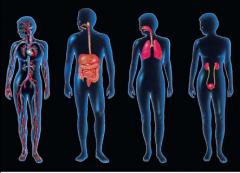
Which one is the circulatory system? |

|
|
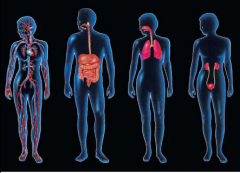
Which one is the urinary system? |

|
|
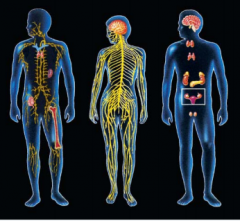
Which one is the immune system? |

|
|
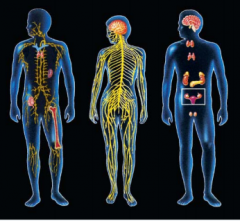
Which one is the nervous system? |

|
|
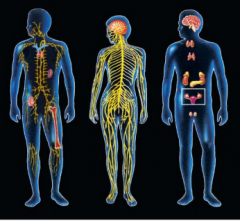
Which one is the endocrine system? |

|
|
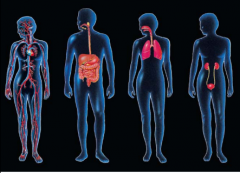
Which one is the digestive system? |

|
|
|
What does the circulatory system do? |
- Transports materials to and from all cells - Participates in the maintenance of body temperature - Participates in mechanisms of defense against disease and injury |
|
|
What does the urinary system do? |
- Maintain the volume and composition of body fluids - Excretes some waste products |
|
|
What does the immune system do? |
- Returns excess tissue fluid to the circulatory system - Participates in both general and specific (immune) defense responses |
|
|
What does the nervous system do? |
- Detects both external and internal stimuli - Controls and coordinates rapid responses to these stimuli - Intergrates the activities of other organ systems |
|
|
What does the endocrine system do? |
- Produces hormones that regulate many body functions - Participates with the nervous system in integrative functions |
|
|
What does the digestive system do? |
- Provides the body with water and nutrients - (The liver) synthesizes certain proteins and lipids for the body - (The liver) inactivates many chemicals, including hormones, drugs, and poisions |

